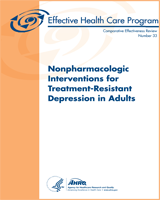From: Executive Summary

Nonpharmacologic Interventions for Treatment-Resistant Depression in Adults [Internet].
Comparative Effectiveness Reviews, No. 33.
Gaynes BN, Lux LJ, Lloyd SW, et al.
Rockville (MD): Agency for Healthcare Research and Quality (US); 2011 Sep.
NCBI Bookshelf. A service of the National Library of Medicine, National Institutes of Health.